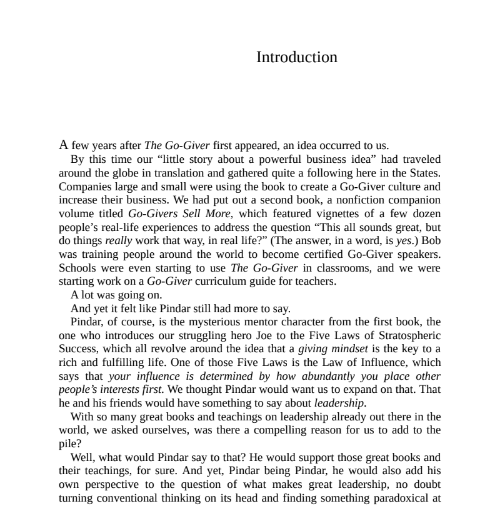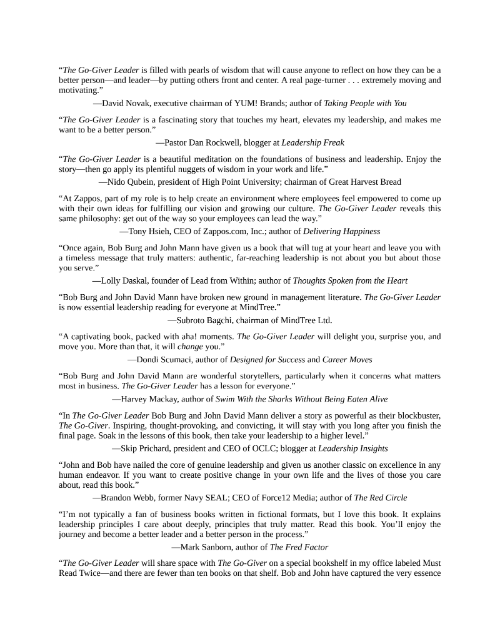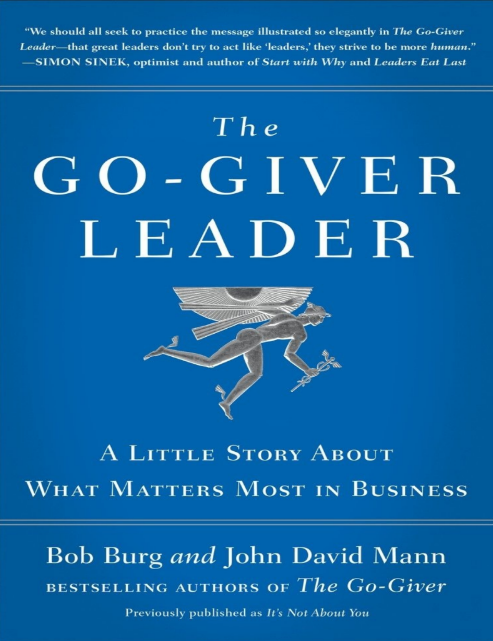Bên dưới đây mình có spoil trước 1 phần nội dung của cuốn sách với mục tiêu là để bạn tham khảo và tìm hiểu trước về nội dung của cuốn sách. Để xem được toàn bộ nội dung của cuốn sách này thì bạn hãy nhấn vào nút “Tải sách PDF ngay” ở bên trên để tải được cuốn sách bản full có tiếng Việt hoàn toàn MIỄN PHÍ nhé!



During those years, quite a few readers had also been asking us, “How do Go- Giver ideas work in the realm of leadership? What does a go-giver leader look like?” This book is our effort to answer that question. We wrote this story and published it in 2011 under the title, It’s Not About You. This title seemed to nicely echo the core idea of The Go-Giver: that shifting one’s emphasis from getting to giving, from a me focus to an other focus, leads to greater and often unexpected returns. Made perfect sense. Or at least, we thought it did. That wasn’t how others saw it, though. Many read the title It’s Not About You and thought, “Well, if it’s not about me, I suppose there’s no point in my reading it.” We soon realized that the book’s title didn’t make clear what the book was actually about.
So our incredibly supportive publishing partners at Portfolio / Penguin agreed to let us retitle the book and give it a new jacket, creating the book you now hold in your hands. Sharp-eyed readers will note that we’ve also made some revisions to the story itself, especially in its concluding chapters and in Ben’s fifth and final “Key to Legendary Leadership.” This has allowed us to better capture in words just what it was that Ben finally learned—what lies at the heart of Pindar’s leadership secret. We are thrilled to be able to bring the true heart of the story to light and share it with you. Because the truth is, it is about you. It’s about you, and about what happens when you focus on making it about others. It’s about how the best way to increase your own influence is to give it away: Pindar’s paradox. This little story is about some big ideas—vision and empathy, influence and character, loss and triumph. Yet the best of these are but abstractions on the page until they are breathed to life through flesh-and-blood experience.
As he reached the head of the table he saw two chairs and, standing by them, Allen & Augustine’s two cochairmen. He was introduced first to a slender, soft-spoken gentleman: Allen, cofounder of the company, who greeted Ben quietly—and then the barrel-chested man standing next to him, who gave Ben a warm welcome and a two-fisted handshake: Allen’s brother Augustine. Next he met a burly man with tree-trunk hands. This was Frank, VP of Production. Frank said not a word, giving only a terse nod. Finally Ben was introduced to the VP of Finance and Personnel, Karen, a petite woman with dark intelligent eyes. “So this is Ben,” she said. Ben couldn’t quite decide whether she seemed hostile or just cautious. If he could influence these four executives successfully, Ben knew he’d have the company. He had to win them over.
To convince them. In a word, to conquer them. “Let’s not kid ourselves,” he’d muttered to his reflection in the mirror that morning while shaving. “This is a battlefield.” In his twelve years with the Marden Group, Ben had moved from sales to sales management to division manager. Now, at the tender age of thirty-four, he had been promoted to a position—on probation—in the firm’s highly competitive Mergers & Acquisitions department. Ben’s task was to lead the transition—”a smooth transition,” as the boss had emphasized when giving Ben the job just three days earlier—with this newly acquired company, helping them become a successful, productive part of the Marden Group. One big, happy family.
In fact, that was the company’s slogan: We hold you up. Ben couldn’t help thinking what a hokey motto that was. “Tiny chairs for tots, tykes, and nursery nooks,” he continued. “Big bold boardroom chairs. Classic country kitchen chairs, elegant straight-back dining- room chairs, cozy deep-cushioned settin’ chairs for grandparents, comfy rockers for nursing moms. “The chairs that held a generation.” Ben noticed the body language in the room as people stiffly shifted position. Not good. “From what I understand, half our city council were fed, burped, and rocked to sleep in Allen & Augustine chairs.”
He paused for a fraction of a second, then added, “And that was just this past weekend.” This got a decent laugh from around the table. Good. “All hand-designed, all exquisite,” he repeated. “That’s how your catalog describes your wares. And you know what? It’s also a fitting description of your company. “You are, as you all know, a legend in this city. “The entire business community appreciates what a tight-knit organization you have here. Many of your employees have been here from the start, or at least the early days, and I understand there are even a good number of second- generation employees. “It’s no secret that Allen & Augustine has been one of our city’s great success stories.” He stopped once more for a fraction of a second. “But…” Ben had learned to wield the word but like a cutlass, using it to slice through his opponents’ most potent premises and propositions. Sometimes he employed it slyly, like a concealed trapdoor. At other times it had all the subtlety of a hand grenade. Like now.


